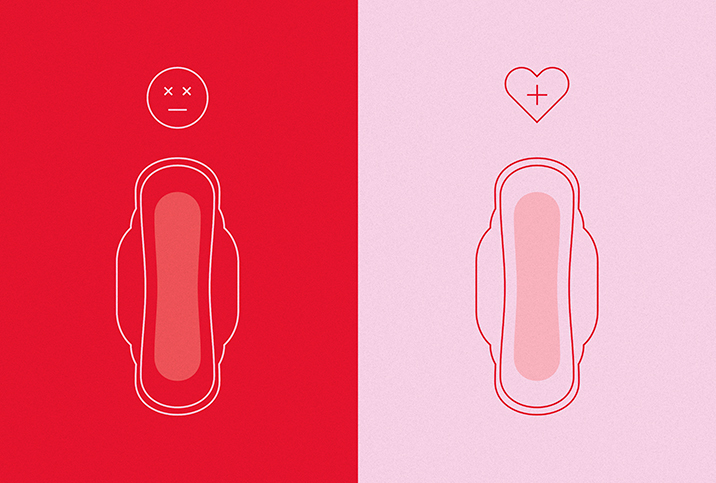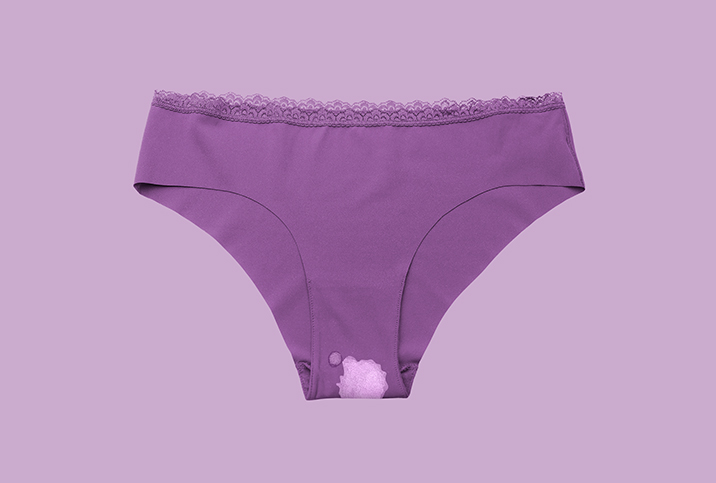How to Find Healthier Feminine Hygiene Products

Toxic period products are the last thing you want to worry about when you're dealing with cramps, fatigue and mood changes during your period.
Unfortunately, feminine hygiene companies don't always prioritize women's health. Studies have found toxic chemicals linked to allergies, cancer and reproductive harm in tampons and other period products.
Since the vagina is highly sensitive and super absorbent, women need to be extremely cautious about what's really in their period products.
How period products work
Pads, pantyliners, tampons and period underwear have to live up to many modern expectations. At a minimum, you want your products to absorb liquid, keep you dry and fresh, be leakproof to protect your clothing and prevent the dreaded "period smell."
There are three main layers in period products to achieve these goals:
- Moisture-wicking top layer. Dries fast and draws away wetness into the absorbent layer.
- Absorbent mid-layer. The main core that can be made of cotton, rayon, wood pulp and other chemicals like Super Absorbent Polymers (SAPs).
- Barrier layer. Leak-resistant layer that protects clothing, sheets and fabric.
While all of these features help women feel clean and functional on their period, they come with a price: potentially harmful chemicals that can have long-term health implications for their bodies.
Since period products are considered Class II medical devices, companies don't have to disclose every ingredient used in manufacturing.
"They focus on what is not in the product but rarely disclose what is in the product they are marketing," said Erum N. Ilyas, M.D., a board-certified dermatologist, functional textile expert and the founder of Wayne, Pennsylvania-based AmberNoon.
Chemicals in period products
OK, so which toxic chemicals are regularly found in period products?
PFAS
PFAS (short for per- and polyfluoroalkyl substances) are synthetic chemicals used to keep clothing, including period underwear, waterproof and leakproof. More than 9,000 PFAS are linked to health problems, such as cancer and hormone disruption.
Although many period underwear companies claim to be PFAS-free, they often haven't tested for all 9,000 of these substances. Before buying period underwear, be sure to check the specific manufacturing process of the product. If the information seems vague, seek a more transparent brand.
Super-absorbent polymers (SAPs)
"Organic cotton alone cannot absorb the volume of blood and discharge most [women] need during the heaviest days of their period, so the presence of SAPs is often required," Ilyas explained.
SAPs are petroleum-based, so they take hundreds of years to degrade. They have been linked to skin rashes and toxic shock syndrome (TSS). For this reason, SAPs were banned from use in tampons in the 1980s, but they can still be used in some sanitary pads and pantyliners.
Dioxins
Many tampons and pads contain a blend of cotton and rayon, which are bleached to achieve that clean white look. Dioxins are a byproduct of the bleaching process and have been linked to reduced fertility, endometriosis and cancer.
"The FDA has stated that tampons are no longer bleached using elemental chlorine, so dioxin levels are negligible in every type of tampon," said Sophia Yen, M.D., M.P.H., the co-founder and CEO of Pandia Health. "Results from studies at independent laboratories concluded that the dioxin in the rayon raw materials range from undetectable 0.1 to 1 parts per trillion."
Although the level of dioxins in tampons is regulated by the FDA to stay below concentrations with toxic effects, exposure to the chemical can occur in other ways, and it accumulates in your body over time, potentially causing health issues. Fortunately, "exposure to dioxins through tampons...does not significantly contribute to dioxin exposures in the United States," according to a 2002 study in the journal Environmental Health Perspectives. Dietary exposure to dioxins is much greater, the researchers noted.
Fragrances
Women shouldn't feel embarrassed about the way their vagina smells, but unfortunately, some do. Scented period products mask the "fishy" period smell but come at the cost of potential allergic reactions.
"Several studies have demonstrated the presence of numerous allergenic scents in period products," Ilyas said. She recommends looking for a product with a "fragrance-free" label since the word "unscented" does not necessarily mean there is no fragrance.
Parabens and TCC (triclocarban)
"Parabens and TCC are in a category of potentially endocrine-disrupting chemicals and may be used in period products as a preservative for their antimicrobial properties," Ilyas said. Antimicrobials are used to prevent the growth of bacteria while the products are in the packaging and while in use.
As with dioxins and phthalates, parabens and TCC are regulated by the FDA to stay below concentrations with toxic effects. However, a 2020 study published in the journal Environment International suggested that exposure to endocrine-disrupting chemicals, including parabens and TCCs, while using period products was statistically significant.
"The dermal absorption doses from the use of feminine hygiene products, under different exposure scenarios, were 0.19-27.9 percent and 0.01-6.2 percent of the total exposure doses of phthalates and bisphenols, respectively," the study authors stated.
This was the first study to report on the occurrence of these chemicals in period care products, and more research is needed.
How to choose better products
There is no "perfect" period product. As menstrual blood adds neutralizing proteins to the vagina, which is normally more acidic, its ability to kill bacteria is reduced.
For this reason, bacteria can build up in "natural" and reusable products, including period underwear, reusable pads and menstrual cups. If you use these products, you have to wash and care for them properly to get rid of the bacteria.
When it comes to disposable pads and tampons, some amount of antimicrobials and other chemicals may be necessary to prevent the buildup of bacteria, which can cause infections.
Pads and tampons
"When choosing pads and tampons, ensure the material is made of 100 percent cotton," said Kristy W. Gilbraith, R.N., the founder of FLOH Wear by Nashville-based UndiesLoft. "Consumers should also look for 'chlorine-free, pesticide-free, dye-free cotton' on the packaging."
Pads and tampons made of 100 percent organic cotton can be a healthier choice for your vagina, because they are less likely to contain dioxins, parabens or other chemicals. For complete transparency, look for a brand that lists all of the ingredients used.
Menstrual cups
"Although they don't seem to contain toxins, menstrual cups do have a risk of toxic shock, just like tampons," Yen said. "The shape and volume of menstrual cups allow more oxygen to enter and bacteria to grow. The bacteria then builds up on the cup, which makes it harder to sterilize."
Yen said you should wash your hands before inserting the cup and use it for only about eight hours at a time. To disinfect the cup, place it in boiling water or microwave it according to the care instructions.
Period underwear
The latest trend in reusable period products is period underwear, but they can still contain unregulated chemicals such as PFAS. Just because a brand is popular doesn't mean it's safe.
"Look for the OEKO-Tex 100 Standard Certified or SGS Certified [designation]," Gilbraith said. "These international standards were created to ensure consumer safety in relation to chemicals used in textile processing."
Unfortunately, it seems every type of period product poses some kind of health risk. Women need to investigate what's in their products and find what works for them. If you notice any kind of rash or allergic reaction after using a new product, it's wise to see your doctor or a dermatologist.


















